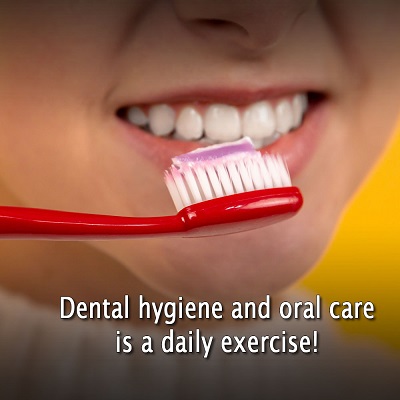 Proper dental hygiene and daily oral care will benefit your teeth, mouth, and gums. You can avoid oral problems such as bad breath, tooth decay, gingivitis, and periodontitis, which can eventually lead to tooth loss and/or irreparable damage to your gums.
Proper dental hygiene and daily oral care will benefit your teeth, mouth, and gums. You can avoid oral problems such as bad breath, tooth decay, gingivitis, and periodontitis, which can eventually lead to tooth loss and/or irreparable damage to your gums.
Unfortunately, many people don’t realize the importance of dental hygiene, in that a lack of dental hygiene poses risks to their overall health.
So, if you want to keep your natural teeth and a healthy body into your senior years, these oral health habits can prevent the growth of harmful oral bacteria that can cause you problems in more than your teeth.
Good Dental Hygiene and Care Checklist
- Brush your teeth after every meal, or at least morning and night if that is not possible. Use a soft toothbrush and brush gently around your teeth and gums in a circular motion. Make sure that your whole mouth, including the tongue, is covered with your toothbrush to get rid of residues on your tooth surface to reduce plaque and mouth odor.
- Replace your toothbrush after 3 to 4 months to ensure that your teeth will be cleaned properly.
- Use toothpaste with calcium. It will strengthen your tooth enamel and protect against tooth decay.
- Use a mouthwash if you cannot brush your teeth after meals.
- Floss in between your teeth at least once daily, preferably in the evening. This will remove food particles and plaque in between your teeth that a toothbrush cannot remove. It will improve your oral health.
- Substitute unhealthy foods with a healthy balanced diet, one that is good for building strong teeth. Instead of high carbs and sugary foods, eat foods high in fiber and other nutrients needed for oral health such as calcium, magnesium, and phosphorus to prevent tooth decay. Examples are fatty fish because it lessens the risk of tooth decay and green leafy veggies that are prebiotic and which healthy bacteria like to feed on. Dark leafy veggies are also rich in minerals that will aid in the mineralization of your teeth to strengthen the enamel.
- Meanwhile, avoid highly acidic and processed foods because they have no essential nutrients. Acidic fruits, coffee, all kinds of soda, and tea can destroy your tooth enamel. Their acidity may contribute to gum inflammation, tooth decay, and disruption of your oral health. Avoid crackers because they turn into sugar that oral bacteria can feast on. Dried fruits are lacking in water and became caramelized.
- Supplement your daily diet with Vitamins A and C to develop healthy gums and ward off gum diseases. Also, ample amounts of citrus fruits, dairy products, and eggs assist good oral health.
- Drink more water after every meal and eat chewy fruits and veggies. Hydration is important to keep your body and your mouth healthy. It washes out food particles and removes the damaging effect of acidic and sticky foods and drinks from your mouth. Water induces saliva, which has anti-microbial and anti-inflammatory attributes. It keeps your mouth clean by washing out the residues and acids created by bacteria.
- Avoid smoking.
- Have a professional dental check-up and cleaning every six months so that your dentist can examine your teeth and detect and remedy any dental problem early. This is to avoid expensive and painful treatments that will be needed if this dental problem becomes severe.
How Do You Know You Have Good Dental Hygiene & Care?
During the routine check-ups, your dentist and hygienist can give you the right feedback on the general health of your mouth, teeth, and gums. In between dental visits you may know the state of your oral health by the following indications:
- You have no persistent foul-smelling breath.
- Your gums are constantly in the ‘pink of health.’
- Your gums do not bleed or are not sensitive while brushing or flossing.
- Your teeth are clean and free from tooth decay, cavities, plaque, and tartar.
- Your teeth look clean and bright.
If you follow the above tips you will enjoy the benefits of a healthy mouth, gums, and teeth and look your best when you smile. Lastly, it will save you from having oral health problems and accompanying health complications. So, be orally mindful and you’ll forever be grateful.






